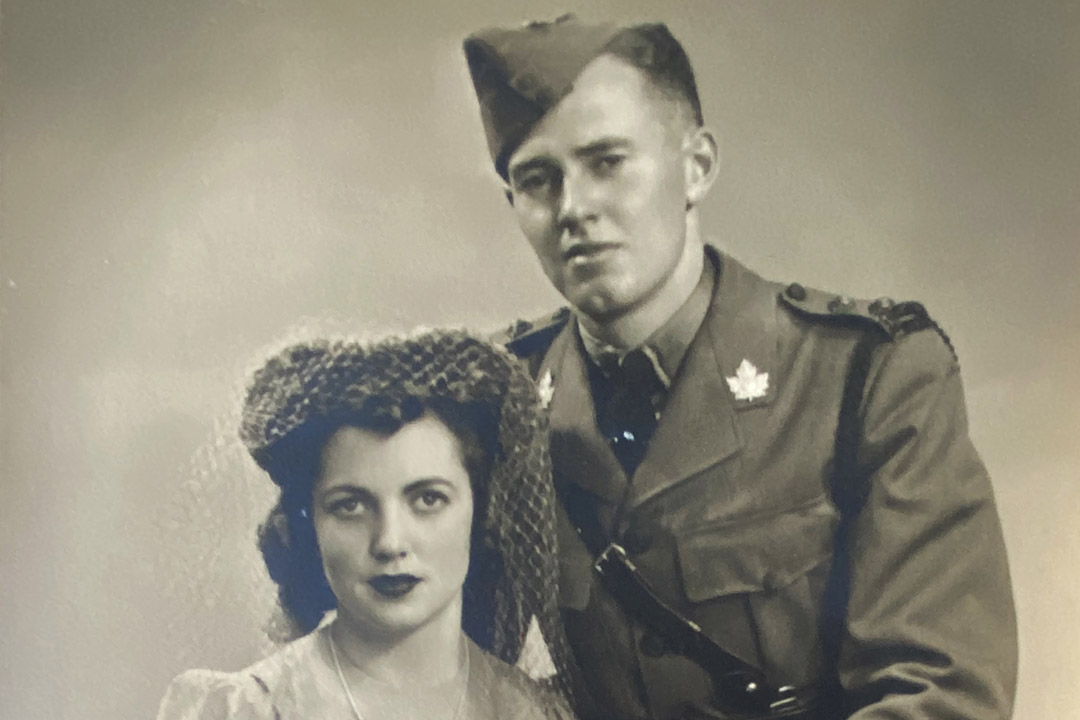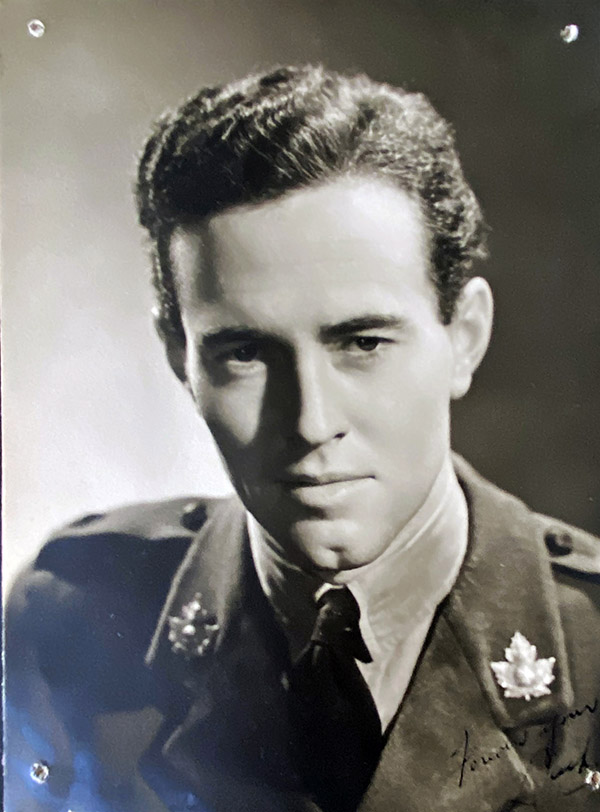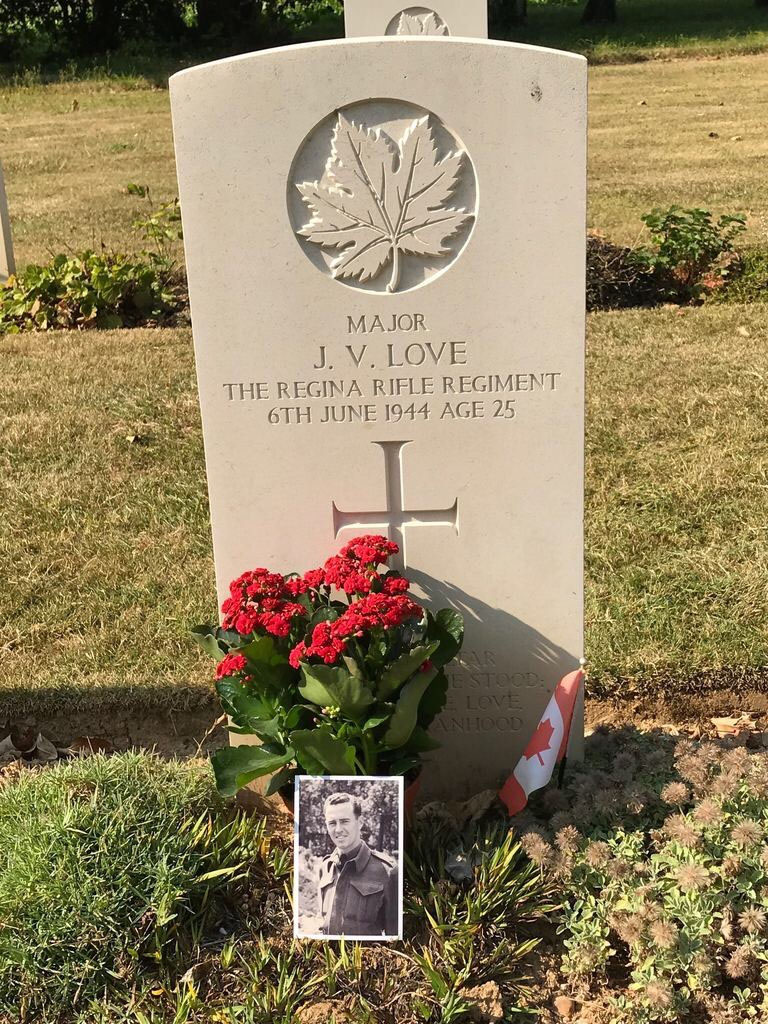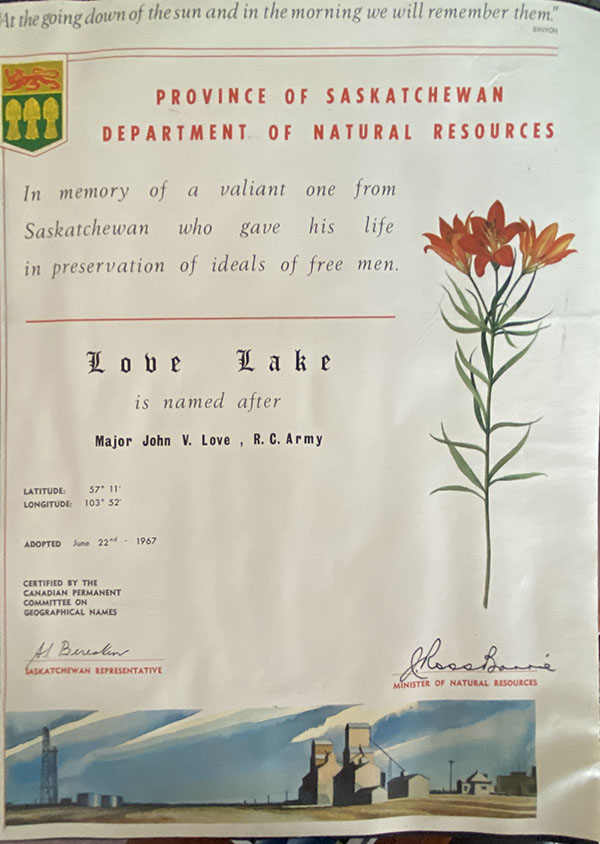
80th anniversary of D-Day: A tragic USask Love story
Eighty years ago today on June 6, 1944, the D-Day Allied assault on the Normandy beaches in France helped turn the tide of the Second World War. But the invasion came at a terrible cost of lives lived and lost – including former University of Saskatchewan student Major John (Jack) Vernon Love – and grieving loved ones left behind.
By James ShewagaA total of 359 Canadians were killed in the Juno Beach landings on D-Day, with Major Love one of 44 members of the Regina Rifle Regiment lost that day in the attack on the most heavily defended position along Juno Beach, when his landing craft struck a mine just off shore. Left to mourn Love’s loss back home in Canada were family and friends, including his parents John and Ethel Love of Yorkton, Sask., his brothers and sisters, and his young bride Margaret Fisher Ferguson (later Fallis) and her family from Fort Qu’Appelle, Sask.
She received the devastating news while working in the fashion industry in Toronto, where they were married on July 11, 1941, before moving to Nova Scotia where Love was posted. Like so many war-time brides, they had only a brief six weeks together as a married couple, before Love was shipped overseas, to never return again.

“I was 14 before my mother could bear to tell me about Jack, and then only to put a heartbreak of my own into perspective, which it surely did,” said daughter Penny Harvey, whose father was Margaret’s second husband, Lt. Col. Edwin Keith Fallis who also served in the Second World War. “I honour Jack for his service, and will never forget his sacrifice. I honour my mother too for her losses – a husband, unborn children, and years of her youth spent waiting for someone who would never return – for growing stronger and wiser from the experience, and for eventually finding the courage to build a different but full and overall wonderful life. But another life was lost; the one that she and Jack had planned.”
Raised in Yorkton, Love left a job with the Department of Agriculture in Regina in the summer of 1939 and moved to Saskatoon to study medicine at USask for a year, before joining the war effort when he enlisted in the army in Regina on June 1, 1940. His wife Margaret – daughter of early tuberculosis researcher Dr. Robert Ferguson (awarded an Honorary Degree by USask in 1946) – also attended university at USask from 1938-39 before moving to Chicago to study fashion design for a year, prior to their wedding in 1941 in Toronto. After a one-day honeymoon in Quebec City, they moved to Nova Scotia where Love was stationed at Canadian Forces Station Debert, before Love was sent to Europe six weeks later.

For Harvey and her sister Shanti Fallis Huebner and brothers David Fallis and Robert Fallis, their mother’s first marriage during the war was a chapter in her life that they never knew about until years later. In 2013, Penny, Shanti and David wrote and self-published a biography in honour of their mother’s remarkable life, titled Portrait of an Artist: M. Fallis. In the book, the siblings share the story of their mother’s war-time marriage to Love, the heartbreak of losing their unborn baby after he headed overseas, and the devastation of learning of her husband’s death on D-Day at the age of 25.
In the book, they wrote:
“In the three years between their wedding and D-Day, Jack was promoted from Lieutenant to Captain to Major. But all he and Margie ever had were those first six weeks together, their censored letters, and photographs. Margie lost her husband Jack on D-Day, June 6, 1944: the end of their dream of a life together. Jack died a hero, memorialized in Normandy, but that was small consolation. As Margie’s daughter Shanti Fallis Huebner describes it, ‘She was an amazing woman and had so many different chapters in her life ... things we can’t even imagine. Like one’s husband going to war ... the waiting ... the not knowing ... then the stark reality of death.’”
Shortly after Harvey learned of her mother’s first marriage, the family moved overseas with their father, Lt. Col. Fallis, a career Royal Canadian Air Force pilot who was later posted to France. There, the family took the opportunity to pay tribute to their mother’s first husband by travelling to the Beny-sur-Mer Canadian War Cemetery overlooking Juno Beach, where 2,048 Canadian soldiers lie forever at rest, including Major Love.

“While there, we went to the Canadian cemetery so my mother could visit Jack’s grave,” said Harvey. “We were moved and astounded by the seemingly endless rows of headstones for war casualties. Over the years we were all both honoured and saddened to know of his service and the tragedy our mother had needed to overcome to go on and live her life to the full. Along with her sense of humour, her hard-won courage was an inspiration as she faced that loss and others, but carried on to make the absolute most of whatever time she was given.
“The generations that knew Jack Love are almost gone, but stories of his heroism live on in family oral history. On D-Day and November 11th, he is remembered, embodying all who sacrificed their lives for our freedom.”
Harvey’s mother passed away on April 21, 2005, at the age of 85, surrounded by family at her home in Victoria. She is remembered as a successful artist and art historian, philanthropist, businessperson, lay minister, world traveller, and life-long student (earning her bachelor’s and master’s in her 60s), as well as a loving wife, mother and friend.
Major Love was one of more than 2,500 USask students, staff, faculty, and alumni who served in the Second World War and one of the 202 who were killed in action. He is commemorated on the Yorkton War Memorial, with Love Lake in Northern Saskatchewan also named in his honour. His headstone in the cemetery overlooking Juno Beach reads: MAJOR JV LOVE, REGINA RIFLE REGIMENT, 6TH JUNE 1944 AGE 25. UPON THE ALTAR OF THE WORLD HE STOOD; RETURNED LIFE, LOVE, FAME AND MANHOOD.
Article re-posted on .
View original article.
